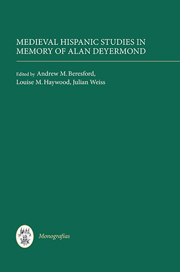Book contents
- Frontmatter
- Contents
- Contributors
- Foreword: Alan Deyermond: A Memoir
- Acknowledgments
- Abbreviations
- Introduction: Alan Deyermond, 1932–2009
- 1 Sanctity and Prejudice in Medieval Castilian Hagiography: The Legend of St Moses the Ethiopian
- 2 The Image of the Phoenix in Catalan and Castilian Poetry from Ausiàs March to Crespi de Valldaura
- 3 On the Frontiers of Juan Rodríguez del Padrón's Siervo libre de amor
- 4 Memory as Mester in the Libro de Alexandre and Libro de Apolonio
- 5 Advancing on ‘Álora’
- 6 Time is of the Essence: Essence, Existence, and Reminiscence in Two Portuguese Poets
- 7 Gómez Manrique's Exclamación e querella de la governación: Poem and Commentary
- 8 The Misa de amor in the Spanish Cancioneros and the Sentimental Romance
- 9 ‘Manus mee distillaverunt mirram’: The Essence of the Virgin and an Interpretation of Myrrh in the Vita Christi of Isabel de Villena
- 10 ‘Nos soli sumus christiani’: Conversos in the Texts of the Toledo Rebellion of 1449
- 11 Vernacular Commentaries and Glosses in Late Medieval Castile, II: A Checklist of Classical Texts in Translation
- 12 Games of Love and War in the Castilian Frontier Ballads: El romance del juego de ajedrez and El romance de la conquista de Antequera
- 13 ‘Esta tan triste partida’ (Conde Dirlos, v. 28a): maridos y padres ausentes
- Index
- Tabula in memoriam
Foreword: Alan Deyermond: A Memoir
Published online by Cambridge University Press: 05 May 2013
- Frontmatter
- Contents
- Contributors
- Foreword: Alan Deyermond: A Memoir
- Acknowledgments
- Abbreviations
- Introduction: Alan Deyermond, 1932–2009
- 1 Sanctity and Prejudice in Medieval Castilian Hagiography: The Legend of St Moses the Ethiopian
- 2 The Image of the Phoenix in Catalan and Castilian Poetry from Ausiàs March to Crespi de Valldaura
- 3 On the Frontiers of Juan Rodríguez del Padrón's Siervo libre de amor
- 4 Memory as Mester in the Libro de Alexandre and Libro de Apolonio
- 5 Advancing on ‘Álora’
- 6 Time is of the Essence: Essence, Existence, and Reminiscence in Two Portuguese Poets
- 7 Gómez Manrique's Exclamación e querella de la governación: Poem and Commentary
- 8 The Misa de amor in the Spanish Cancioneros and the Sentimental Romance
- 9 ‘Manus mee distillaverunt mirram’: The Essence of the Virgin and an Interpretation of Myrrh in the Vita Christi of Isabel de Villena
- 10 ‘Nos soli sumus christiani’: Conversos in the Texts of the Toledo Rebellion of 1449
- 11 Vernacular Commentaries and Glosses in Late Medieval Castile, II: A Checklist of Classical Texts in Translation
- 12 Games of Love and War in the Castilian Frontier Ballads: El romance del juego de ajedrez and El romance de la conquista de Antequera
- 13 ‘Esta tan triste partida’ (Conde Dirlos, v. 28a): maridos y padres ausentes
- Index
- Tabula in memoriam
Summary
One of my earliest memories of my father is of us both in his office in Westfield College. He is standing at the door, answering a knock from what sounds like a student, and I, aged probably about three and sitting in his chair, am taking advantage of his distraction to eat the bar of chocolate he keeps in his desk drawer.
I am struck by this memory, thinking back about my father, because of what it suggests about him. This was in the mid-1970s, two decades before the emergence of ‘Take Your Daughter to Work Day’, but it seemed quite normal – to both of us, I think – that he would bring me into college from time to time, just as it seemed absolutely unremarkable that I could wander in to his study at home whenever I wanted. It was only later that I discovered that not all academic fathers allowed their children to interrupt their work, or to assist them with typing their book manuscripts, or to choose the colour of their book covers (red, for the Lazarillo de Tormes critical guide).
All the tributes to my father since his death have commented on both his extraordinary research output and the closeness of his relationship to his family. These two things need to be understood as wholly interdependent. My father never saw his work as a sphere distinct from the rest of his life, or his personal life as a distraction from his work.
- Type
- Chapter
- Information
- Medieval Hispanic Studies in Memory of Alan Deyermond , pp. xiii - xvPublisher: Boydell & BrewerPrint publication year: 2013



